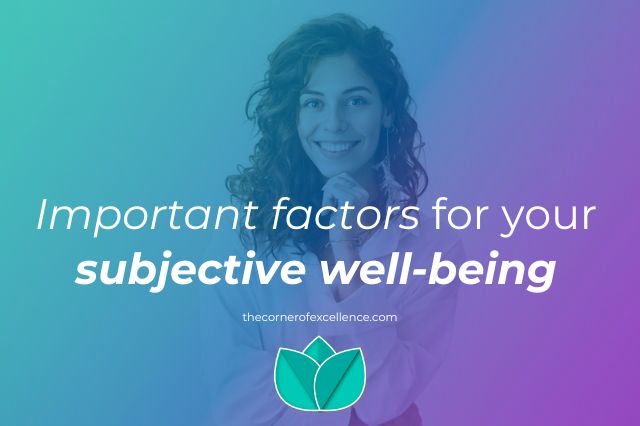There are many factors that influence our well-being. There are what we can call objective factors. But there is also subjective well-being. That is, what you perceive and feel about how you are. Let us see what are the factors that influence your subjective well-being.
Factors for objective well-being
By objective factors I mean healthy habits that are good for all of us. These are general guidelines to take care of your health and well-being. We can say that this is a universal recipe.
Enjoying a quality sleep, eating healthy, doing physical exercise contribute to your objective well-being and your health.
Factors for your subjective well-being
However, then there are also factors that I will call subjective. These are elements that depend on who and how you are. If you want to take care of your well-being in an integral way, it is convenient to take into account your personality and your perception of the world. Because what relaxes one person can stress or bore another.
Your personality or behaviour pattern
You may have heard of Type A and Type B personalities. This concept was developed by American cardiologists Meyer Friedman and Raymond Rosenman to classify responses to stress.
Now, types A, B, C and D, as well as subcategories, are differentiated. This means that there are several levels in each behaviour pattern. In addition, our pattern may vary depending on the type of situation. That means we can be Type A at work but Type B in our personal life, for example. But in general it can give us an indication of why we stress more or less.
Type A
If you belong more to the Type A personality, you are more competitive, ambitious, practical, impatient and aggressive. You always need to be doing something and you find it hard to relax. Type A people are more prone to stress, high blood pressure, heart conditions, and social isolation.
Type B
People with Type B personality are the opposite of Type A. They are relaxed, patient, carefree, and cheerful. They are also flexible, adapt to situations and accept things as they come. These are uncompetitive people who like to do things calmly. For all these reasons, they are less prone to stress and resulting ailments.
Type C
In this third category we find prudent, thoughtful, sensitive, critical, systematic and reserved people. They analyse situations well to make informed decisions. They do not usually take risks until they have examined all the details. Having an eye for detail, they detect things that others miss. These people feel comfortable in professions related to numbers and logic. However, perhaps precisely because of this attention to detail, they tend to be highly critical of themselves and others. They also tend to be perfectionists. According to research, type C seems more likely to develop cancer.
Type D
Type D people tend to be negative, pessimistic, feel sad or even depressed, irritable, and socially inhibited. They worry too much and lack self-confidence. They avoid opening up to others and sharing their negative emotions. That causes them a lot of stress. Along with type A, this is the behaviour pattern most prone to heart disease. According to studies, if they have suffered a heart attack they are pretty likely to suffer a second episode.
Extraversion vs. Introversion
Among the factors for subjective well-being, this characteristic should also be taken into account. Do you know if you are more of an extravert or an introvert? We each find ourselves somewhere between the two extremes. Depending on this, social interactions fill us with more energy or subtract it from us.
If you are more of an extrovert, you will love to surround yourself with people. If you lack social interaction you will notice it in your mood. Family gatherings, hangouts with friends or crowded events fill you with energy and help you de-stress. To take care of your well-being, try to make plans with people.
If you are more on the introverted side, you will need fewer social interactions. To relieve stress and restore energy, activities alone or in small groups are best for you. If you are given a choice between an event with a lot of people or a coffee with a friend, you will prefer the latter.
Life satisfaction
Another important factor for your subjective well-being is how satisfied you feel with your life. Are you happy with your personal life? What do you think about your work? Do you feel that you have a purpose and that your life has a meaning? All this influences your psychological well-being.
Consider what the different important aspects of your life are. Then rate how satisfied you are with each one, for example by assigning a score from 0 to 10, with 10 being the most satisfied. These aspects could be partner, family, friends, health, interests/hobbies, work, finances, personal development etc. Once you have decided on the aspects and scored them, which aspect do you want to improve? What steps can you take to achieve it?
Your perception and your expectations
We each perceive the world in a different way. Our senses, our experiences, how we talk to ourselves and how we talk to others form a map of the world. Added to this are expectations about how your life should be, how you ought to be and how others should behave. Which references do you take to compare yourself and your situation? How do you expect things to be? All this influences your subjective well-being.
Your sensory system
Our perception greatly influences our well-being. The stimuli that we receive from the environment pass through a series of filters: our vision, hearing, sense of taste and touch, memories, beliefs, values, attitude, etc.
Therefore, how we perceive our world and situations affects us differently. Perhaps you have heard of sensory systems. We each have a predominant way of assimilating the information and stimuli that we receive. If I ask you if you are more visual, auditory, kinesthetic or digital auditory, you might know what I mean.
Well, it turns out that knowing that helps you understand why there are certain situations that bother you more or less than other people. Also, why you like certain forms of relaxation more or less.
For example, working next to a construction site can drive a predominantly auditory or auditory digital person crazy. However, a more visual or kinesthetic person will be less bothered.
Having video-conference meetings tires a kinesthetic person more because they need personal contact. Working in a grey office without decorative elements affects the mood of a visual person more.
Your interests
Which are your interests? What things are you good at? Which things amuse you? We each have our strengths and interests. The question is if you dedicate time to them. Your subjective well-being will increase when you take time for what interests you and is fun; when you do activities that develop your strengths.
All this promotes your personal development as well as getting you out of the rut, providing you with fun, experiences and learning. So think about interests and hobbies that you have neglected. How can you recover them? When will you take time for them?
Support and recognition
A final factor for your subjective well-being is how you feel treated by others. Do you feel that you have a support network or that you have to carry all the weight alone? Do you have the feeling of receiving recognition for your work? Lack of support and recognition cause stress, due to making you feel alone, undervalued and unappreciated.
How is your subjective well-being?
Did you know the factors that affect your subjective well-being? Have any of them surprised you? Which ones should you pay more attention to?

Sharing is caring!




